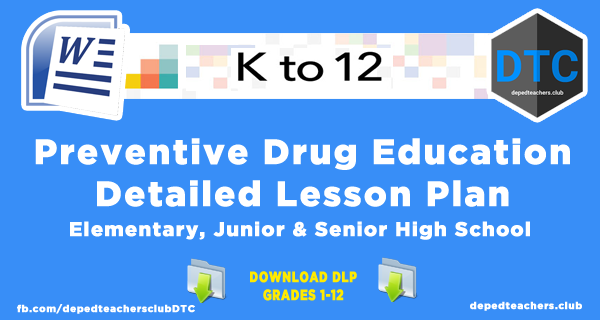


Preparing for lessons through the Daily Lesson Log (DLL) or Detailed Lesson Plan (DLP) and provides teachers with an opportunity for reflection on what learners need to learn, how learners learn, and how best to facilitate the learning process. These guidelines also aim to empower teachers to carry out quality instruction that recognizes the diversity of learners inside the classroom, is committed to learners’ success, allows the use of varied instructional and formative assessment strategies including the use of information and communications technologies (ICTs), and enables the teacher to guide, mentor, and support learners in developing and assessing their learning across the curriculum.
DLP – by its meaning is a teacher’s detailed description of the course of instruction that follows the following outline:
The Department of Education (DepEd) issues the enclosed Preventive Drug Education Program Policy for Curriculum and Instruction in support of the National Drug Education Program as provided in Section 43, Article IV of Republic Act No. 9165, hereunder quoted as follows:
Instruction on drug abuse prevention and control shall be integrated in the elementary, secondary and tertiary curricula of all public and private schools, whether general, technical, vocational or agro-industrial as well as in nonformal, informal and indigenous learning systems. Such instructions shall include: (1) Adverse effects of the abuse and misuse of dangerous drugs on the person, the family, the school and the community; (2) Preventive measures against drug abuse; (3) Health, socio-cultural, psychological, legal and economic dimensions and implications of the drug problem; (4) Steps to take when intervention on behalf of a drug dependent needed, as well as the services available for the treatment and rehabilitation of drug dependents; and (5) Misconceptions about the use of dangerous drugs such as, but not limited to, the importance and safety of dangerous drugs for medical and therapeutic use as well as the differentiation between medical patients and drug dependents in order to avoid confusion and accidental stigmatization in the consciousness of the students otherwise known as the Comprehensive Dangerous Drugs Act of 2001.
Likewise, as stated in the Political Declaration and Plan of Action of the United Nations Office of Drugs and Crime (UNODC) of which the Philippines is a member, the worlds drug problem remains a common and shared responsibility that requires effective and increased international cooperation that demands an integrated, multidisciplinary, and balanced approach to supply and demand reduction strategies.
The policy aims to:
Here below can be downloaded the Preventive Drug Education Detailed Lesson Plans in Ready made ms word format, Please click on the links below to download each files by their respective grades.